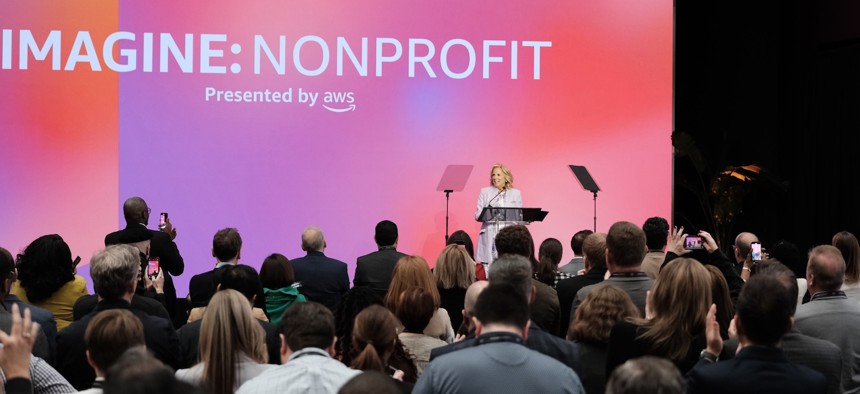Tech, AI feature in new White House order to advance women's health research

First Lady Dr. Jill Biden speaks on women's health research at a March 20, 2024 event at an AWS event in Arlington, Va. Jack Huynh/Orange Photography
First Lady Jill Biden argued a lack of such research has led to healthcare practices that are largely “based on men.”
The Biden administration issued an executive order on Monday pressing federal agencies to expand and prioritize research on women’s health. According to First Lady Jill Biden, technology can play a major role in that effort.
“Joe is directing his administration to find ways to use artificial intelligence and other technology to advance research on women's health,” she said during a keynote at an Amazon Web Services event on Wednesday. “Women's health research has been overlooked and underfunded. Too many of our medications, treatments and medical school textbooks are based on men.”
The inclusion of women and minorities in clinical research funded by the National Institutes of Health wasn’t required in law until 1993, and the White House says that there is a remaining gap in knowledge about women’s health. Diseases that affect women more than men are also more likely to be underfunded.
The problems have real consequences: A University of Chicago and University of California Berkeley study in 2020 found that women are widely overmedicated and disproportionately subject to side effects, due to the lack of women in clinical drug studies.
The executive order builds on an initiative on women’s health research launched by the White House last year and led by Jill Biden.
The order directs agencies in that initiative, which include the Departments of Health and Human Services, Veterans Affairs and the Office of Management and Budget, to strengthen scientific and data standards on women’s health across research and funding opportunities.
Member agencies are also directed to prioritize funding for women’s health research, with OMB tapped to assess gaps in federal funding for health research alongside the White house’s Gender Policy Council.
A particular focus in the order is filling research gaps on women’s midlife health, including diseases like heart attacks and osteoporosis.
The order also includes directions for HHS and the National Science Foundation to consider how AI can be used to advance research on women’s health — as they already work to implement the administration’s existing executive order on AI — as well as the “challenges that affect women’s health research in the responsible deployment and use of artificial intelligence and AI-enabled technologies in the health and human services sector.”
“These historic actions will make sure that women's health is no longer overlooked or left behind. And when we combine that momentum with the possibility of technology, we can imagine a new world for women's health,” said Jill Biden, pointing to the promise of advances like virtual doctors appointments. “The solution [women] need… could be artificial intelligence that analyzes more information faster to predict and prevent diseases.”
NSF investments in AI research “promise to advance women’s health issues, from cardiovascular disease to menopause-related conditions,” Wendy Nilsen, deputy division director for NSF’s Information and Intelligent Systems division, told Nextgov/FCW in a statement.
“They also are poised to address existing gaps in women’s research, enable the analysis of large datasets, untangle the relationships between complex biological and environmental factors affecting women’s health, and set the stage for groundbreaking discoveries that will shape the future of women’s health,” said Nilsen.
The executive order was also accompanied by a range of actions and commitments from agencies, including the launch of a National Institutes of Health effort to close research gaps.
In his recent State of the Union address, President Biden asked Congress to allocate $12 billion to create a Fund for Women’s Health Research at NIH, and just months ago the Advanced Research Projects Agency for Health — ARPA-H — announced a $100 million sprint on women’s health.
HHS did not respond to request for comment by the publication of this story.
Nextgov/FCW staff reporters Edward Graham and Alexandra Kelley contributed to this story.
NEXT STORY: State selects 4 new Science Envoys



